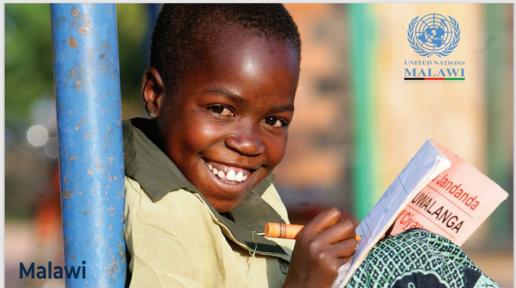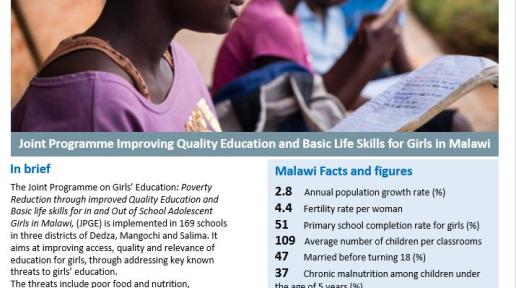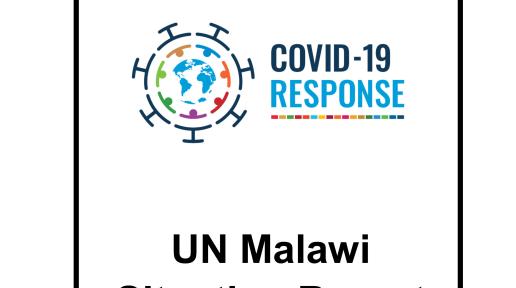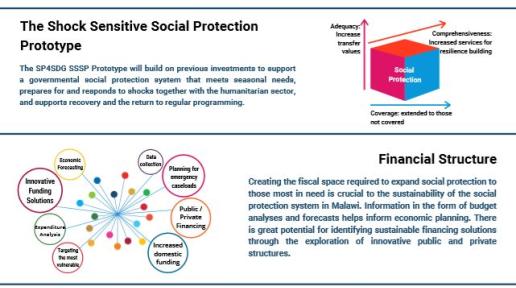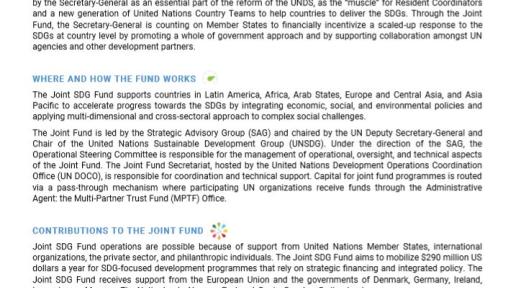Publication
23 May 2024
THE UNITED NATIONS SUSTAINABLE DEVELOPMENT COOPERATION FRAMEWORK FOR MALAWI 2024-2028
The United Nations (UN) in partnership with the government through the Result Groups developed the Malawi 2024-2028 UN Sustainability Development Cooperation Framework (UNSDCF) under the guidance of the Joint National Steering Committee, co-chaired by the Secretary to the President and Cabinet and the UN Resident Coordinator. This is the UN Development System’s compact with Government of Malawi to support the attainment of Malawi 2063, the country’s long term development plan to transform Malawi into “an inclusively wealthy and self-reliant industrialized upper-middle-income country by the year 2063”, taking into consideration its first 10-year Implementation Plan 2021-2030 (MIP-1) and the achievement of most of the UN Sustainable Development Goals (SDGs) by 2030 and the African Union Agenda 2063. The UNSDCF is rooted in guiding principles such as Leave No One Behind (LNOB); integrated and multidimensional programing; human rights-based approach to development; gender equality and women’s empowerment; resilience; sustainability; and accountability. The framework outlines an ambitious program designed to expedite development progress during the Decade of Action, focusing on six SDG transitions: (1) food systems; (2) energy access and affordability; (3) digital connectivity; (4) education; (5) job and social protection; and (6) climate change, biodiversity loss and pollution. The UNSDCF draws insights from the preceding Malawi 2019-2023 UN Development Assistance Framework evaluation and the forward-looking common country analysis and identifies four mutually reinforcing strategic priority areas developed based on the UN's comparative advantage, technical and financial capacity, and alignment with Malaŵi’s 2063 and ten-year Malaŵi Implementation Plan. These strategic priorities include sustainable, diversified, and inclusive growth; institutional governance strengthening; sustainable investments and human capital development; and adapting to climate change and environmental degradation. The UNSDCF is implemented through biennial Joint Work Plans, catalytic joint programs, and UN entity programming instruments. The projected cost for UNSDCF implementation from 2024-2028 is $1.761 billion, spanning 23 UN agencies. Despite securing 36% of the required resources, a notable funding gap of $1.127 billion persists. To address this gap, the UN aims to establish strategic partnerships to mobilize additional resources. The implementation progress of the UNSDCF will be systematically tracked through UN INFO, an online platform designed for planning, monitoring, and reporting. This approach aims to bolster coordination, transparency, and accountability for outcomes while optimizing the utilization of existing national data and information systems. Furthermore, the UN will strengthen data-related capacities, including collection, analysis, disaggregation, and utilization, in support of national systems for effective SDG monitoring. To ensure enduring development outcomes beyond the Cooperation Framework towards 2030, the UN will employ strategies such as promoting participatory and inclusive consultation, facilitating knowledge exchange and peer learning, supporting diverse and sustainable financing options, regularly assessing progress and challenges, fostering cooperation between humanitarian, development, and peacebuilding efforts, and developing and reviewing exit strategies for joint programs in collaboration with the government.


